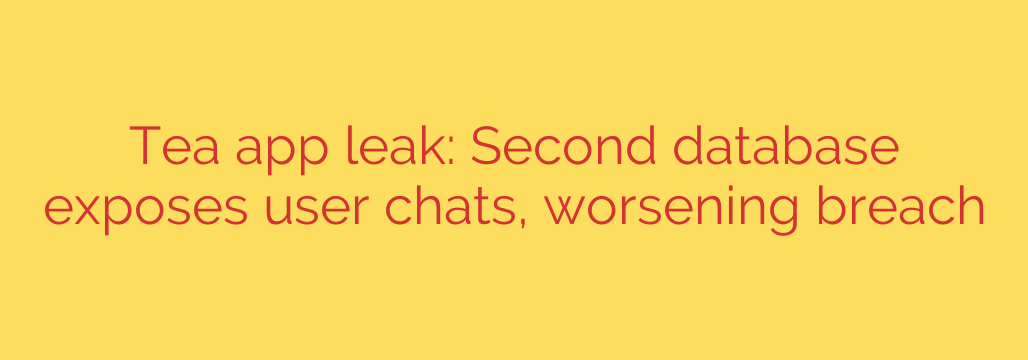
Major Data Breach Rocks Tea App, Exposing Private User Chats and Information
In a significant and alarming cybersecurity event, a popular messaging platform known as the Tea app has suffered a massive data breach. The situation has worsened dramatically with the discovery of a second, completely unsecured database, exposing highly sensitive user information, including the content of private conversations.
This breach goes far beyond typical data leaks, moving from user metadata to the very substance of personal chats, creating a severe privacy crisis for its user base.
A Worsening Security Crisis: What We Know
Initially, reports surfaced about a security lapse involving the Tea app’s user data. However, the problem escalated when security researchers found a second exposed database. This server was left entirely without password protection or encryption, making its contents accessible to anyone who knew where to look.
The second database contained a wealth of information far more sensitive than the first. While the initial leak involved user credentials and device details, this new discovery has confirmed that private chat messages between users were also completely exposed. The failure to secure this data represents a fundamental breakdown in the company’s responsibility to protect its users.
What Specific User Data Was Exposed?
The scale of this breach is substantial. The combination of data from both unsecured databases paints a detailed picture of users’ digital lives. Anyone who accessed the data could have retrieved the following:
- Private Chat Messages: The full content of conversations between users was laid bare.
- User IDs and Nicknames: Information used to identify users on the platform.
- Authentication Tokens: These are digital keys that can potentially be used to gain access to user accounts without a password.
- Device Information: Details such as operating system (OS) version, device model, and IP addresses.
- Contact Lists: The app appeared to have access to and stored user contact lists.
- Email Addresses: Personal email addresses linked to the accounts were also included in the leak.
The exposure of authentication tokens is particularly dangerous, as malicious actors could use them to hijack sessions, take over accounts, and impersonate users.
The Dangers of Exposed Chat Logs and Personal Data
When private conversations and personal identifiers are leaked, the risks extend far beyond simple spam. Users of the Tea app should be aware of the following threats:
- Blackmail and Extortion: Malicious actors can use the content of private or embarrassing conversations to extort money from victims.
- Targeted Phishing Scams: With access to names, email addresses, and even conversational context, scammers can craft highly convincing and personalized phishing emails or messages to steal further information, like banking details.
- Identity Theft: The combination of exposed personal information can be used to impersonate individuals, open fraudulent accounts, or commit other forms of identity fraud.
- Account Takeover: Using leaked authentication tokens or by leveraging personal information for password resets, attackers could gain full control of a user’s Tea app account and potentially other linked accounts.
Actionable Steps to Protect Your Digital Identity
If you are or were a user of the Tea app, it is crucial to act immediately to mitigate the risk. Even if you don’t use this specific app, these tips are essential for maintaining good digital hygiene in an age of frequent data breaches.
- Change Your Passwords Immediately: If you used the same or a similar password for the Tea app on other websites or services, change it everywhere. Prioritize critical accounts like email, banking, and social media. Use a unique, complex password for every account.
- Enable Two-Factor Authentication (2FA): 2FA is one of the most effective ways to secure your accounts. It requires a second form of verification (like a code from your phone) in addition to your password, making it much harder for attackers to gain access even if they have your credentials.
- Beware of Unsolicited Messages: Be extra vigilant about unexpected emails or messages. Scammers will use the information from this breach to create targeted attacks. Do not click on suspicious links or download attachments from unknown senders.
- Delete the Account and the App: Given the severity of this breach and the company’s failure to protect user data, the safest course of action is to permanently delete your Tea app account and remove the application from your devices.
- Monitor Your Accounts: Keep a close eye on your financial statements and other online accounts for any unusual activity.
This incident serves as a stark reminder that the data we entrust to applications is not always safe. Choosing services with a strong track record in security and privacy, and practicing proactive digital safety, is more important than ever.
Source: https://www.bleepingcomputer.com/news/security/tea-app-leak-worsens-with-second-database-exposing-user-chats/








